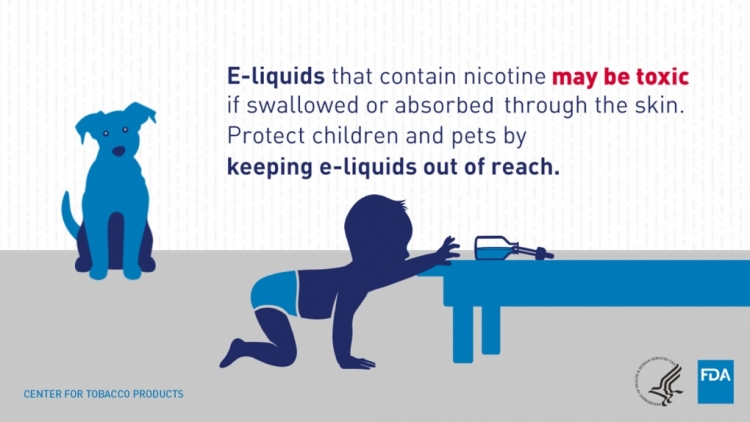How to properly store e-liquids to prevent accidental exposure to children and pets
U.S. Food and Drug Administration (FDA)
Accidental exposure to nicotine-containing e-liquids - the liquid used in “vape” products - can cause injury and even death in children. It’s important to keep these products away from kids and to be prepared in case of accidental ingestion or other emergencies due to unintended exposure.
E-liquids, especially those containing even small amounts of nicotine, can be dangerous to children if they touch or drink it. Concerningly, from April 2022 to March 2023, 7,043 e-cigarette or e-liquid exposure cases were reported, with approximately 88% of exposures occurring among children under 5 years old. E-liquids also can harm pets.
Why E-Liquids Are Dangerous, Especially for Children
Young children can be severely hurt by drinking e-liquids. Harmful effects can include seizure, coma (a long period of unconsciousness), respiratory arrest (which happens when a person stops breathing), and death. Children may also accidentally be exposed to e-liquids and their contents, including nicotine, through contact in the mouth, contact on the skin (i.e., spilled e-liquid), or by inhaling the e-liquid aerosol.
It’s important to remember that containers for e-liquids can seem tempting to children of all ages for many reasons. But these products are not meant for children, teens, or young adults.
Follow Storage Tips for E-Liquids—and Teach Children to Avoid These Products
Remember that children are curious and put all sorts of things in their mouths. Even if you turn away for a few seconds, they can quickly get into things that could harm them.
You can help prevent accidental exposure to e-liquids by always putting your e-cigarettes and/or e-liquids in a safe and elevated location, in the original containers — and out of the reach and view of children and pets — every time you use them.
Also ask family members, house guests, and other visitors who vape to store their bags or coats that hold e-cigarettes or e-liquids in a safe and elevated location, out of the reach and view of children and pets.
For children old enough to understand, explain to them that these products can be dangerous and should not be touched. Tell kids that you or another adult are the only people who should handle these products.
Know the Poison Control Phone Number
To be prepared in case of an emergency, also add the Poison Control HELP number (1-800-222-1222) to your phone contacts.
Proper Handling of E-Liquids
When you remove products (adult-only) from their storage locations, it is important to handle them in a way that may help to prevent kids’ exposure to e-liquids.
• Store e-liquids in their original containers. This will help children know to avoid these products.
• Lock product caps when you’re not using them. If a bottle has a cap that turns, twist it until you cannot twist anymore.
• Avoid getting e-liquid on your skin or in your eyes. E-liquid exposure can cause burning and irritation, among other problems. In case of accidental contact with the skin, wash the area thoroughly with soap and water. If the e-liquid gets in your eyes, rinse thoroughly with water, and seek medical attention if there are changes in your vision.
• Clean up any spills or splashes immediately using soap and water.
• NEVER drink e-liquid, or allow anyone to drink it, because the liquid nicotine can be poisonous. If a person of any age drinks e-liquid, accidental or not, immediately call Poison Control at 1-800-222-1222. Also call this number if you think your child has been exposed to these products—even if you’re not completely sure.
Report Safety Issues to the FDA
The FDA has regulatory authority over all tobacco products—including e-cigarettes and other vaping products, cigars, cigarettes, smokeless tobacco, hookah, and pipe tobacco—as part of its mission to protect public health.
The FDA continues to warn companies that mislead kids with e-liquids that imitate food products (such as juice boxes, candy, or cookies). The FDA also is pursuing other steps to protect youth from the dangers of tobacco products, such as continuing to enforce regulations addressing youth access and exploring measures to make tobacco products less toxic, appealing, and addictive.
